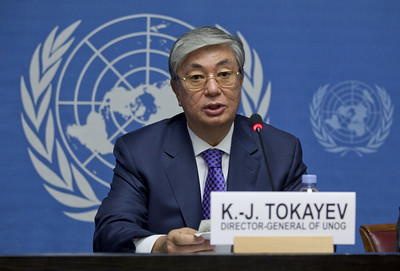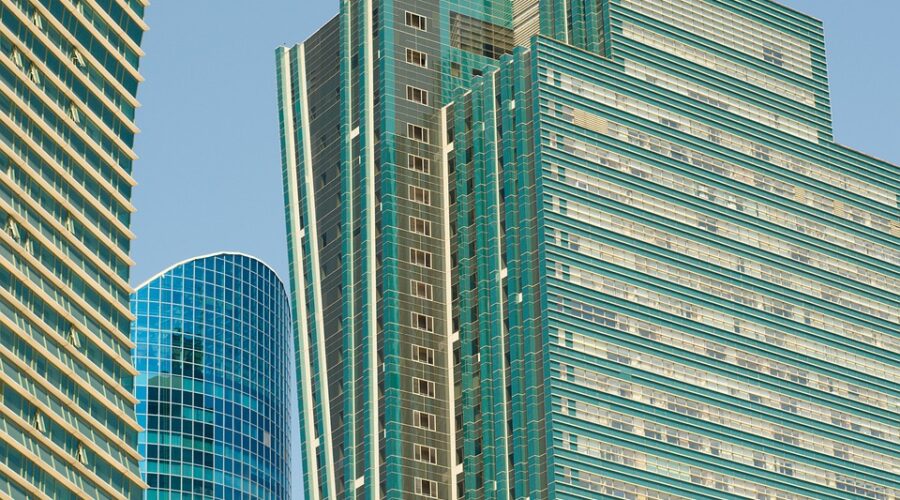Kazakhstan, the largest country in Central Asia, seeks to position itself as an important regional and global actor that has good relations with all major powers. Even though Astana is Russia’s ally in the Collective Security Treaty Organization (CSTO), and also a member of the Russian-dominated Eurasian Economic Union (EAEU), the former Soviet republic has managed to preserve its “multi-vector” foreign policy and avoid choosing a side in the Ukraine conflict. But is such a position sustainable in the long term?
According to Kazakhstan’s President Kassym-Jomart Tokayev, the Central Asian nation has a long history of advancing constructive international relations, serving as a bridge between East and West.
“While this policy has been firmly tested in 2022, it has proven resilient”, Tokayev said on February 7, announcing the Astana International Forum that is expected to take place on June 8-9.
The event will address four key global issues: foreign policy, security and sustainability, energy and climate, as well as economy and finance. All these topics are equally important for all Kazakhstan’s major global partners – Russia, China, the United States, the European Union, and Turkey. From Astana’s perspective, tense relations between Moscow and the West have created room for Kazakhstan to renew the former President Nursultan Nazarbayev’s “multi-vector” foreign policy, which means that the Central Asian nation, at least at this point, does not intend to openly side with any parties involved in the Ukraine war. Instead, Kazakhstan seems interested in creating a “third way” – a position that rejects the extreme views in international politics, but aims to modify various different ideas towards the economic and political realities.

Historically, such a policy is similar to the concept of the Non-Aligned Movement that was formed during the Cold War, largely on the initiative of then-Yugoslav President Josip Broz Tito. Since the world has long entered a new Cold War reality, it is entirely possible that various countries, including Kazakhstan, will tend to preserve good ties with both, Russia and the West, and at the same time to develop close relations with other major global actors.
On the other hand, China remains Kazakhstan’s biggest trading partner, which means that Astana’s imperative is to have good bilateral ties with both, Moscow and Beijing. Being a Turkic nation, Kazakhstan is also interested in developing a strong cooperation with Turkey. Despite being a CSTO member, the former Soviet republic plans to start manufacturing Turkish-designed ANKA attack drones, while some political forces in Kazakhstan argue that the Central Asian nation should join the European Union.
Given the country’s geographical position, such an idea is unlikely to ever be implemented. However, Kazakhstan’s priority will undoubtedly be to deepen its energy cooperation with the EU, since over 70 percent of its oil exports goes to Europe. In an attempt to diversify its energy supply, the EU will look to purchase more oil from Kazakhstan, and at the same time to create a counterbalance to the Russian influence in the country. Thus, in the mid-term, the Central Asian nation could benefit from the adversarial relations between Moscow and the European Union, especially if Russian and multinational corporations continue relocating their business from Russia to Kazakhstan.
Politically, despite being Russia’s ally, Kazakhstan is expected to preserve its neutral stance regarding the Ukraine war, which means that, on the one hand, it will not join the anti-Russian sanctions, or condemn Russia’s actions in the Eastern European country, but on the other hand it will keep supporting Ukraine’s territorial integrity. As Tokayev told Russian President Vladimir Putin in June 2022, “Astana does not recognize either Taiwan, or Kosovo, or South Ossetia, or Abkhazia, and such a principle will also be applied to Donetsk and Lugansk”. In other words, Kazakhstan respects territorial integrity of all members of the United Nations, and is unlikely to change such a policy.
Quite aware of that, the European Union and the United States could attempt to pressure Astana to distance itself from the Kremlin. Kazakhstan, for its part, will likely try to continue balancing between Russia and the West for as long as possible. It is, therefore, not surprising that Tokayev openly signals that he is ready to pursue Nazarbayev’s “multi-vector” foreign policy.
Thus, in the coming months, Kazakhstan will seek to bring together world and business leaders, aiming to strengthen its role of a bridge between East and West. However, the final outcome of the Ukraine war will likely have a serious impact on Astana’s foreign policy course. If Russia suffers a defeat in the Eastern European country, Kazakhstan, as well as other Moscow’s Central Asian allies, could eventually withdraw from both the CSTO and the EAEU, which will leave room for Turkey, China and the Western powers to increase their influence in the strategically import region that has traditionally been in the Kremlin’s geopolitical orbit.
Images: United States Mission Geneva and kuanish-sar

